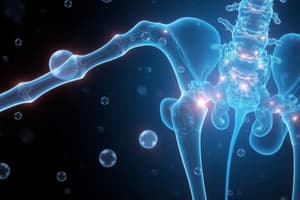Podcast
Questions and Answers
What is the therapeutic class of alendronate?
What is the therapeutic class of alendronate?
- Antidepressant
- Antibiotic
- Pain reliever
- Drug for osteoporosis (correct)
What pharmacologic class does alendronate belong to?
What pharmacologic class does alendronate belong to?
- Analgesic
- Biphosphonate (correct)
- Anticonvulsant
- Non-steroidal anti-inflammatory
What actions does alendronate perform?
What actions does alendronate perform?
Alendronate lowers serum alkaline phosphatase.
List one use of alendronate.
List one use of alendronate.
What are the regimens for taking alendronate?
What are the regimens for taking alendronate?
Alendronate can be taken with food to enhance absorption.
Alendronate can be taken with food to enhance absorption.
What are some adverse effects of alendronate?
What are some adverse effects of alendronate?
Which of the following is a contraindication for alendronate?
Which of the following is a contraindication for alendronate?
What is a potential drug-drug interaction with alendronate?
What is a potential drug-drug interaction with alendronate?
The trade name of alendronate is ______.
The trade name of alendronate is ______.
What is the treatment for hypocalcemia resulting from an overdose of alendronate?
What is the treatment for hypocalcemia resulting from an overdose of alendronate?
Study Notes
Alendronate (Fosamax) Overview
- Therapeutic class: Drug specifically indicated for osteoporosis treatment.
- Pharmacologic class: Classified as a biphosphonate and acts as a bone resorption inhibitor.
Mechanism of Action
- Alendronate works by lowering serum alkaline phosphatase, an enzyme linked to bone turnover, enhancing bone stability.
Indications
- Used for prevention and treatment of osteoporosis in postmenopausal women.
- Effective in treating corticosteroid-induced osteoporosis.
- Increases bone mass in men with osteoporosis.
- Treatment for symptomatic Paget's disease.
Dosing Regimens
- Available in multiple dosing schedules: daily (10 mg), twice weekly (35 mg), or weekly (70 mg).
- Critical to take on an empty stomach, two hours before breakfast.
- High doses may lead to gastrointestinal bleeding; therefore, once-daily dosing is preferred.
- Therapeutic effects typically manifest within 1-3 months.
Administration Guidelines
- Administer on an empty stomach with plain water.
- Patient should remain upright for at least 30 minutes post-dose to minimize esophageal irritation.
- Classified as pregnancy category C.
Pharmacokinetics
- Onset of action: 3-6 weeks.
- Peak concentration reached in 3-6 months.
- Effects persist for 12 weeks post-discontinuation.
Adverse Effects
- Potential side effects include gastrointestinal issues (diarrhea, constipation, nausea), hypocalcemia, abdominal pain, and dyspepsia.
- Risk of pathologic fractures increases if used beyond three months or in chronic overdose cases.
Contraindications and Precautions
- Not suitable for individuals with osteomalacia, esophageal abnormalities, or hypersensitivity to alendronate.
- Caution required for patients with renal impairment, heart failure, liver disease, or active upper gastrointestinal conditions.
Drug Interactions
- Absorption may be hindered by calcium, iron, aluminum or magnesium-containing antacids, and certain minerals.
- Concurrent alcohol use may exacerbate osteoporosis risk and promote gastric irritation.
Dietary Considerations
- Adequate intake of vitamin D, calcium, and phosphates is necessary for optimal treatment effectiveness.
- Excessive calcium supplements or dairy can negatively affect alendronate absorption.
Overdose Treatment
- Hypocalcemia is a likely consequence of overdose, manageable with oral or intravenous calcium salts.
Trade Name
- Marketed under the trade name Fosamax.
Studying That Suits You
Use AI to generate personalized quizzes and flashcards to suit your learning preferences.
Description
This quiz provides an overview of Alendronate, a medication used for treating osteoporosis. It covers its therapeutic and pharmacologic classifications, mechanism of action, indications, and dosing regimens. Test your knowledge on the administration guidelines and therapeutic effects of this important drug.




